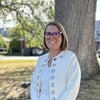A Look Back And A Look Ahead | WPI prof broke down barriers for women, but there's still more room for growth
A quick peek at Helen G. Vassallo’s biography — scientific researcher, college professor, national “Woman of the Year,” motivational speaker, multi-degree holder, helicopter pilot, ceaseless seeker of knowledge, and mother of 10 — could make one feel somewhat exhausted, if not a bit of a slacker.
But Vassallo, who is a professor of management at Worcester Polytechnic Institute and associate director of WPI’s School of Industrial Management, is not anywhere close to kicking back and sitting on the porch.
“I have no plans to retire,” said the professor, who recently took a few minutes from her day to discuss the role of women in the workforce — a topic, it is safe to say, with which she is quite familiar.
In The Minority
When Vassallo first came to WPI to teach in 1967, she was on loan from another Worcester college, Clark University. She found she was one of only two women professors on campus.
“We were both in the chemistry department,” she recalled. “I was teaching molecular biology and she was teaching chemistry.”
During Vassallo’s 20 years in the private sector, it was a very similar situation. She joined Astra Pharmaceutical Products where she started as a researcher, eventually working her way up to director of scientific and professional information. While she was at Astra in 1967, she received the third of her four degrees — a Ph.D. in physiology from Clark University. She has a B.S. in biology and an M.S. in pharmacology, both from Tufts University, as well as an M.B.A. from WPI.
When Vassallo looked around the room at Astra, all she saw were men. One day at a meeting, someone at the table made a remark that could have been viewed as condescending, she said.
“She is one of us,” said the then-head of Astra, admonishing the man for his less- than-enlightened view of women in the workplace.
While women and men are not yet complete workplace equals, progress has been made, she said. Salaries are becoming more equitable and attitudes are changing.
“It has been a long, long process,” she said. “It seems for every two steps forward, there is a step back.”
The male-female salary disparity is something that has been addressed in some sectors, but not in all, said Vassallo. WPI has made a concerted effort to bring the salaries of its female professors, who now number 46, in line with those of the male professors, she said. However, women as a whole are still being paid less than men for doing the same work. She hopes that inequity soon disappears everywhere.
Vassallo knows that women themselves can play a role in making that happen.
“Women don’t realize that they can negotiate. Sometimes, they just say ‘thank you.’ But, they can be more assertive and ask the [employer] if they could do a bit better.”
Looking Up
The glass ceiling so often spoken of in respect to women has “a lot of cracks in it,” she believes.
More and more incoming female students at WPI are choosing majors formerly viewed as exclusively male. There are more women studying biology and engineering than there were when Vassallo first began teaching. And while women are still not flocking to fields such as electrical engineering, they are populating civil engineering classrooms — a field a bit more focused on creating beneficial things, such as water treatment plants, she said.
“I think women see that as an easier place for themselves,” she said.
But attitudes and expectations are definitely changing.
Over the years, Vassallo has conducted a bit of research in her own classes. She asks her male students what they would do if they were offered a job somewhere else. Would they accept the offer without first discussing it with their wives?
“All of them said yes. And the women said they would follow their husbands.”
The same exercise done more than 25 years later shows an evolution in thinking.
The male students said they would absolutely discuss the offer with their spouse. And, if the wife happens to makes more money than them, they would go wherever she went, Vassallo said.
“We are getting toward fifty-fifty.
Ellen O’Connor is a freelance writer based in Worcester.











0 Comments